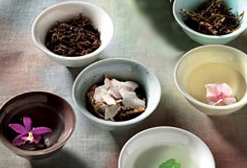Traditional Chinese Medicine
A Time-Tested Path to Holistic Healing

Traditional Chinese medicine (TCM), originating in China and based on Daoist philosophy, focuses on balancing body, mind, and spirit for overall health. In New Zealand, it is a regulated profession known for acupuncture, herbal medicine, moxibustion, cupping, and gua sha, and also considers diet and lifestyle. Instead of only treating symptoms, TCM aims to address the underlying causes of illness and enhance the body’s natural healing through therapies that restore balance and promote long-term wellness.
At Gleamy Acupuncture Centre, we use ancient wisdom to blend TCM herbal formulation tailored to your needs to help you achieve lasting vitality, resilience, and well-being.
The Foundation of TCM: Balance and Flow
At the heart of TCM is Qi (vital energy), the life force that flows through pathways called meridians, connecting your organs, tissues, and systems.
Optimal health in TCM reflects a state of balanced Qi - where energy moves smoothly, supporting physical vitality, mental clarity, and emotional stability. When this flow becomes disrupted or weakened, the body's natural harmony is compromised, potentially resulting in pain, disease, or chronic conditions.
TCM therapies work to rebalance Qi, strengthen the body’s defences, and promote natural healing—not just masking symptoms, but fostering deep, sustainable wellness.

Introduction to How TCM Herbal Medicine Works
Traditional Chinese Herbal Medicine is a sophisticated healing system that has been refined over thousands of years. Unlike Western medicine, which often targets specific symptoms or pathogens, TCM herbs work by correcting underlying imbalances in the body’s Qi (vital energy), blood circulation, and organ systems.
1. Based on TCM Patterns, Not Just Symptoms
TCM does not treat diseases in isolation—instead, it identifies root imbalances that manifest as symptoms. A practitioner will diagnose your condition according to TCM pattern differentiation, such as:
- Qi Deficiency (fatigue, weak digestion, shortness of breath)
- Dampness (bloating, heavy limbs, phlegm)
- Heat vs. Cold (inflammation vs. poor circulation)
- Blood Stasis (pain, dark menstrual clots, varicose veins)
The same illness (e.g., a headache) may be treated with entirely different herbs depending on whether it stems from liver fire rising (hot, throbbing pain) or blood deficiency (dull, lingering pain).
2. Custom Herbal Formulas (Not One Size Fits All)
TCM rarely uses single herbs—instead, practitioners combine multiple herbs into balanced formulas that:
- Target the root cause of illness
- Enhance beneficial effects (e.g., one herb may aid absorption of another)
- Minimize side effects (some herbs "guide" others to reduce toxicity)
For example, Gui Zhi Tang (Cinnamon Twig Decoction) treats colds with sweating and chills, while Bai Hu Tang (White Tiger Decoction) cools high fevers without sweating—even though both may address "fever."
3. Different Forms of Herbal Medicine
After your consultation, we may recommend an herbal formula as part of your treatment plan. Depending on your needs, these formulas can be taken in various forms, including:
- Raw Herbs(loose herbs or pre-packaged)
- Tinctures (liquid extracts)
- Powders or Granules (to be mixed with water)
- Tablets or Capsules (convenient, pre-formulated)
These formulas are tailored to your condition and can help with a wide range of health concerns, from digestive issues and stress to immune support and chronic pain relief. To get more information about the herbal forms, click here.
Why This Matters?
The form of herbal medicine you take affects:
- Speed of results (teas act faster than pills)
- Dosage precision (raw herbs allow finetuning)
- Convenience (pills suit busy lifestyles)
At Gleamy Acupuncture Centre, our skilled TCM practitioner will select the best form based on your condition, lifestyle, and treatment goals.
What to Prepare for Your TCM Visit
Preparing for your TCM visit can help ensure an accurate diagnosis and effective treatment. The following guide will help you understand what to expect and how to best prepare for your TCM consultation.

1. Come with an Open Mind
TCM takes a holistic approach to healing, meaning we will look at your overall health, lifestyle, and emotions, not just the specific issue you are seeking treatment for. This might be different from what you're used to, so it is helpful to come with an open mind.
2. Be Prepared to Share Your Health History:
TCM relies heavily on symptom patterns. During your consultation, we will ask about your current symptoms, but also about your general health, lifestyle habits, diet, sleep patterns, and emotional well-being. This helps us build a complete picture of your health.
Feel free to bring any relevant medical records or test results, and a list of current medications or supplements, or past TCM treatments (if any).
3. What to Tell Your TCM Practitioner:
To ensure safe and effective prescriptions, inform us about:
- Allergies (e.g., to pollen, shellfish, certain plants).
- Current medications (e.g., some herbs interact with blood thinners).
- Pregnancy or breastfeeding (Some herbs are not safe for babies).
- Digestive issues (if you have a sensitive stomach, herbs may be adjusted)
4. Expect a Thorough Assessment
In addition to your medical history, we may check your pulse, tongue appearance, bodily functions (e.g., appetite, bowel movements, urination, menstrual cycle, etc.), and other physical signs. These are important diagnostic tools in TCM, helping us assess your energy flow and any imbalances.
5. Avoid Factors That Could Mask Symptoms: (especially on the day of visit)
- Avoid coffee, strong tea, or stimulants (can affect pulse diagnosis).
- Skip heavy makeup or lipstick (TCM doctors check facial colour).
- Do not eat or drink anything that stains your tongue (like blueberries, coffee, or curry).
- Avoid alcohol, smoking, or excessive exercise (can alter body signs).
6. How Long Will It Take?
Your first consultation will typically last 45-60 minutes, depending on the complexity of your health concerns. Follow-up sessions may be shorter, usually 30-45 minutes.
7. Bring Any Questions You Have
If you are new to TCM, or have concerns about a specific treatment, do not hesitate to ask. We will make sure to explain the process and how it can support your healing.
8. Be Ready for Personalised Recommendations
Based on your diagnosis, you may receive customized treatment recommendations, which may include acupuncture, herbal formulas, dietary changes, and lifestyle tips. These are designed to address the root cause of your symptoms and promote long-term wellness.
9. After the Visit
- Follow prescribed herbal/dietary advice.
- Track changes in symptoms for follow-ups.
